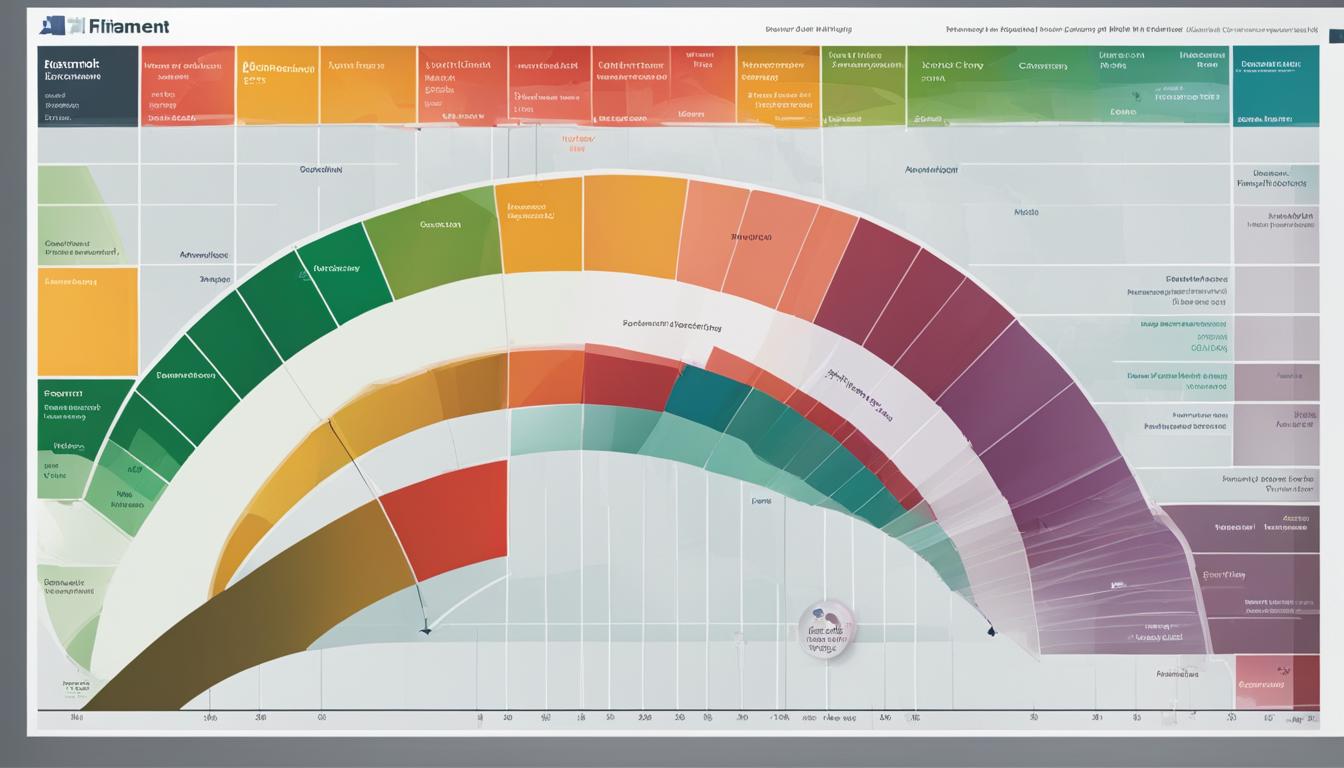In the pursuit of financial goals, we embark on an emotional journey that transcends mere numbers and spreadsheets. It is a transformative process that involves not just financial planning and strategizing, but also a deep emotional commitment and dedication to making our dreams a reality. In this article, we explore the importance of emotional commitment, the process of goal setting, and the impact it has on our overall well-being and fulfillment.
Setting financial goals is not just about numbers; it is about setting a destination for our dreams. It requires us to envision the life we desire, the experiences we long for, and the financial freedom we strive to achieve. But without emotional commitment, these goals remain lofty dreams, distant and untouchable. It is the emotional connection to our aspirations that fuels our motivation, drives us forward, and empowers us to overcome obstacles along the way.
Goal setting is a critical component of our financial planning journey. It provides us with a roadmap, a compass to guide our actions and decisions. With well-defined goals, we can prioritize our efforts, break down complex tasks into manageable steps, and stay focused amidst distractions and setbacks. By setting clear intentions and aligning our actions with our goals, we increase our chances of success and create a path towards financial fulfillment.
Emotions play a significant role in our financial decision-making process. They can affect our risk tolerance, our spending habits, and our ability to delay gratification. Being aware of our emotions and understanding how they impact our choices is essential in making sound financial decisions. By managing our emotions, we can maintain a rational mindset, make informed choices, and ensure that our decisions align with our long-term financial goals.
Key Takeaways:
- Emotional commitment is vital in the pursuit of financial goals, as it provides the motivation and resilience needed to overcome challenges.
- Setting clear and well-defined goals is crucial for effective financial planning and helps us stay focused and on track.
- Emotions have a significant impact on our financial decision-making process, and managing them is key to making sound choices.
- Overcoming emotional barriers requires self-awareness, perseverance, and a willingness to confront and address our fears and limiting beliefs.
- Cultivating emotional resilience is essential in navigating the ups and downs of the financial goal achievement process and maintaining a positive mindset.
The Power of Emotional Commitment in Financial Goal Achievement
Emotional commitment is a powerful driving force in the pursuit of financial goals. It goes beyond mere financial aspirations and involves aligning our values, beliefs, and desires with our goals. When we develop a strong emotional connection to our financial objectives, we increase our chances of success and fulfillment.
Emotional commitment means more than just setting financial goals; it means emotionally investing ourselves in their achievement.
When we are emotionally committed to our financial goals, we are more motivated to take consistent action, even when faced with challenges or setbacks. We develop resilience and perseverance, powering through difficult times and maintaining our focus on the bigger picture.
By aligning our emotions with our financial goals, we create a deeper sense of purpose and meaning, driving us closer to fulfillment.
Emotional commitment is the secret ingredient that turns financial goals into meaningful and fulfilling experiences.
Imagine a financial goal of starting your own business. It’s not just about the numbers; it’s about the passion, determination, and emotional fulfillment that comes with building something from the ground up. This emotional commitment fuels your drive and helps you overcome the inevitable challenges and obstacles along the way.
Emotional commitment brings depth and significance to our financial journey, making it more than just numbers on a balance sheet.
When we achieve our financial goals, the emotional fulfillment that accompanies our success is immeasurable. We experience a sense of accomplishment, pride, and self-worth that cannot be quantified. It’s not just about the money; it’s about the personal growth and fulfillment that come from aligning our financial pursuits with our values and dreams.
Emotional commitment makes the journey towards financial goals worth every moment.
So, how can you cultivate emotional commitment in your pursuit of financial goals? It starts with reflecting on what truly matters to you and why you are pursuing these goals. Define your values, explore your aspirations, and visualize the life you want to create through your financial success.
Cultivating emotional commitment requires self-reflection, self-awareness, and a deep understanding of your own desires and motivations.
Remember, it’s not just about the destination; it’s about the emotional journey. By harnessing the power of emotional commitment, you can transform your financial goals into meaningful experiences that bring fulfillment and purpose to your life.
The Importance of Goal Setting in Financial Planning
Goal setting is a crucial component of effective financial planning. By clearly defining our financial objectives, we provide ourselves with a roadmap to follow and a sense of direction. This process allows us to prioritize our actions, make informed decisions, and track our progress along the way.
When it comes to financial planning, setting specific and measurable goals is essential. Whether our aim is to save for retirement, purchase a home, or pay off debt, establishing clear targets helps us stay focused and motivated. Without defined goals, we may wander aimlessly, making it difficult to make progress or assess our success.
By setting goals, we create a framework for action. It provides us with a sense of purpose and empowers us to make intentional choices that align with our financial aspirations. Whether it’s budgeting, investing, or cutting expenses, every decision can be evaluated in the context of our goals, ensuring that each action brings us closer to success.
One effective way to structure our goals is to use the SMART framework, ensuring they are Specific, Measurable, Achievable, Relevant, and Time-bound. This approach allows us to break down our objectives into smaller, actionable steps and measure our progress along the way.
“Setting goals is the first step in turning the invisible into the visible.” – Tony Robbins
Apart from providing direction and motivation, goal setting in financial planning also helps us track our progress. By regularly assessing our achievements, we can gauge if we are on track or need to adjust our strategies. It allows us to celebrate milestones, identify areas for improvement, and make necessary refinements to our financial plans.
Furthermore, setting specific goals in financial planning helps us make better decisions. When presented with various options or temptations, having a clear vision of our desired outcomes enables us to evaluate choices based on their alignment with our goals. This helps us prioritize our expenditures and differentiate between needs and wants, ultimately ensuring that our financial decisions contribute to our long-term success.
Financial Goal Setting Tips:
- Be specific about your financial goals, including the amount you want to achieve, the timeline, and any additional details that are relevant.
- Break down long-term goals into smaller, manageable short-term goals to facilitate progress tracking and maintain motivation.
- Use the SMART framework (Specific, Measurable, Achievable, Relevant, Time-bound) to ensure your goals are well-defined and actionable.
- Regularly review and reassess your goals to adapt to changing circumstances or priorities.
- Write down your goals and keep them visible as a constant reminder of your financial aspirations.
Overall, goal setting plays a vital role in financial planning. By outlining our objectives, we create a roadmap for success, make informed decisions, and stay committed to our financial well-being. With well-defined goals, we can navigate the complexities of personal finance and achieve the financial success we desire.
The Role of Emotions in Financial Decision Making
Emotions play a significant role in our financial decision-making process. They are powerful drivers that can influence our risk tolerance, spending habits, and ability to delay gratification. Understanding and managing our emotions is essential in making sound financial choices that align with our long-term goals.
When it comes to financial decisions, rationality is often pitted against emotions. However, it is important to recognize that emotions are an inherent part of human nature and cannot be completely separated from the decision-making process. Rather than dismissing emotions, we should strive to strike a balance between rationality and emotional awareness.
One way in which emotions impact financial decisions is through risk tolerance. Emotions such as fear and anxiety can cause individuals to become more risk-averse, leading them to avoid investments that may have potential for higher returns. On the other hand, overconfidence and greed can lead to excessive risk-taking, jeopardizing financial stability.
Emotions also influence our spending habits. Impulse buying, retail therapy, and emotional spending are all examples of how our emotions can lead us to make irrational financial choices. Retailers often capitalize on our emotions, using marketing tactics that appeal to our desires and sense of identity. By being aware of these emotional triggers, we can make more informed and intentional purchasing decisions.
“Emotions are like wild horses; unless bridled, they can lead to impulsive and detrimental financial decisions.”
Our ability to delay gratification is another area where emotions come into play. Instant gratification is often driven by our emotions, as we seek immediate satisfaction and pleasure. However, delaying gratification and practicing self-control are essential for long-term financial success. By recognizing the emotional impulse for instant gratification, we can make more rational choices that prioritize our future goals over short-term desires.
Ultimately, emotional intelligence is crucial in financial decision making. By developing self-awareness and understanding our own emotional triggers, we can make more balanced and rational choices. This involves recognizing the emotions that arise during financial decision making, evaluating their potential impact, and consciously adjusting our behaviors to align with our long-term financial goals.

Overcoming Emotional Barriers in the Pursuit of Financial Goals
When it comes to achieving our financial goals, it’s not just about the numbers; it’s also about navigating the emotional obstacles that may arise along the way. Emotions such as fear, self-doubt, and impatience can often stand in our path, hindering our progress and preventing us from taking necessary actions.
Overcoming these emotional barriers requires a combination of self-awareness, resilience, and a willingness to confront and address our fears and limiting beliefs. It’s important to acknowledge and understand the emotions that arise when pursuing financial goals, as they can provide valuable insights into our motivations and thought patterns.
By actively working through these emotional challenges, we can develop the perseverance and determination to push forward, even when faced with adversity. Adopting a growth mindset and viewing setbacks as opportunities for learning and growth can help us maintain momentum and stay focused on our financial aspirations.
One powerful way to overcome emotional barriers is by seeking support and guidance from others. Whether it’s through joining a community of like-minded individuals, seeking advice from financial professionals, or enlisting the help of a mentor, connecting with others who have similar goals can provide encouragement, accountability, and fresh perspectives.
The journey towards financial goals is not just about the destination; it’s about the personal growth and transformation that occur along the way.
By addressing our emotional barriers head-on and actively working through them, we can develop the resilience needed to navigate the challenges that arise on the path to financial success. Overcoming emotional barriers requires perseverance and a commitment to personal growth.
Ultimately, by conquering these emotional obstacles, we become more equipped to achieve our financial goals and experience the greater sense of fulfillment that comes with it.
Techniques to Overcome Emotional Barriers
| Technique | Description |
|---|---|
| Self-reflection | Take time to identify and understand your emotional barriers, their origins, and how they affect your financial goals. |
| Positive affirmations | Reframe negative thoughts and beliefs with positive affirmations to build self-confidence and overcome self-doubt. |
| Visualization | Visualize yourself successfully achieving your financial goals to enhance motivation and overcome fear. |
| Support network | Seek support from friends, family, or financial professionals who can offer guidance, encouragement, and accountability. |
| Goal tracking | Regularly monitor and track your progress towards your financial goals to stay motivated and focused. |
Remember, overcoming emotional barriers is an ongoing process that requires patience, dedication, and a commitment to personal growth. By actively addressing and working through these barriers, you can overcome obstacles, persevere, and continue moving closer to your financial aspirations.

Cultivating Emotional Resilience in Financial Goal Achievement
Emotional resilience is a fundamental trait that plays a critical role in successfully navigating the ups and downs of the financial goal achievement journey. It empowers individuals to bounce back from setbacks, adapt to changing circumstances, and maintain a positive mindset in the face of challenges. Cultivating emotional resilience is essential for effectively handling unexpected obstacles, learning from failures, and staying committed to our financial goals with unwavering optimism and determination.
When pursuing financial goals, it’s natural to encounter unexpected hurdles that can shake our confidence and test our resolve. The ability to remain emotionally resilient allows us to view setbacks as opportunities for growth rather than roadblocks to success. It enables us to analyze and learn from our failures, making adjustments and improvements along the way.
Adaptability is another hallmark of emotional resilience in the context of financial goal achievement. Market fluctuations, economic changes, and personal circumstances can all impact our progress. By cultivating adaptability, we become better equipped to adjust our strategies, make necessary course corrections, and effectively respond to unforeseen challenges.
Financial resilience is about recognizing that setbacks are part of the journey and having the tenacity to keep pushing forward. It involves developing the mental and emotional flexibility needed to adapt to changing circumstances while maintaining focus on our long-term financial goals.
“The greater the obstacle, the more glory in overcoming it.” – Molière
Emotional resilience also helps us manage the emotional rollercoaster that often accompanies the pursuit of financial goals. The journey can be filled with highs and lows, excitement and frustration, and moments of triumph and doubt. By fostering emotional resilience, we can navigate these emotional fluctuations with a sense of balance, maintaining motivation and focus in the face of setbacks and celebrating milestones along the way.
| Benefits of Cultivating Emotional Resilience | How to Cultivate Emotional Resilience |
|---|---|
|
|
Fostering emotional resilience requires an intentional and proactive approach. By implementing strategies that support emotional well-being and adopting a resilient mindset, individuals can navigate the challenges that arise while staying firmly committed to their financial goals.
Summing It Up
Cultivating emotional resilience is a vital aspect of achieving financial goals. It enables individuals to navigate setbacks, adapt to change, and maintain a positive mindset throughout their journey. By fostering emotional resilience, individuals can overcome obstacles, remain focused and committed to their goals, and ultimately achieve long-term financial success.
Celebrating Milestones and Embracing Emotional Success
As we make progress towards our financial goals, it is important to celebrate our milestones and acknowledge our emotional success. Recognizing and appreciating the emotional fulfillment that comes with achieving financial milestones can reinforce our motivation and provide us with a sense of accomplishment. By embracing and savoring these moments, we can stay motivated and inspired to continue our journey towards financial well-being.
Each milestone is a reflection of our efforts, dedication, and progress. It represents a significant step closer to achieving our ultimate financial goals. By celebrating milestones, we not only recognize the tangible achievements but also the emotional growth and personal development that accompany them.
Whether it’s paying off a large debt, reaching a specific savings target, or achieving a long-desired financial milestone, taking the time to acknowledge and celebrate these milestones is key to maintaining motivation and sustaining momentum.
Embracing our emotional success is equally important. It involves recognizing the positive impact that achieving financial goals has on our overall well-being. Financial success often brings a sense of security, freedom, and peace of mind, which can greatly influence our quality of life.
Moreover, acknowledging our emotional success helps us build a positive association with financial achievement. This positive association can deepen our commitment to our goals and provide us with the confidence and belief that we are capable of attaining even greater milestones.
Remember, financial success is not solely defined by reaching a specific monetary target but also by the emotional fulfillment we experience along the way. By celebrating milestones and embracing our emotional success, we cultivate a positive mindset, reinforce our motivation, and ultimately continue our journey towards lasting financial achievement.
Quotes
“Celebrating milestones not only recognizes our financial achievements but also reinforces our motivation and provides a sense of accomplishment.”
“Embracing our emotional success is essential in building a positive association with financial achievement and sustaining momentum towards our goals.”
Milestones in Financial Goal Achievement
| Milestone | Description |
|---|---|
| Successful Debt Repayment | Paying off a significant amount of debt, such as student loans or credit card debt. |
| Building Emergency Fund | Reaching a milestone in saving for unexpected expenses and emergencies. |
| Investment Milestone | Reaching a specific investment portfolio value or achieving desired returns. |
| Retirement Savings Target | Accumulating a certain amount of savings dedicated to retirement. |
| Financial Independence | Reaching a level of financial stability and freedom to pursue personal goals. |
How Can Financial Experiences Impact the Emotional Journey of Achieving Financial Goals?
Navigating through various financial experiences and personal growth can significantly impact one’s emotional journey towards achieving financial goals. Positive experiences may boost confidence and motivation, while negative experiences can lead to feelings of frustration and self-doubt. Acknowledging and learning from these experiences can ultimately shape a person’s financial mindset and behaviors.
Conclusion
The journey towards financial goals is not only a pursuit of monetary targets but also a deeply personal and transformative experience. As we embark on this journey, we must recognize the power of emotional commitment in keeping us motivated and dedicated to our aspirations.
Goal setting serves as a compass, providing us with a clear direction and ensuring that our actions align with our financial objectives. By setting specific, measurable, achievable, relevant, and time-bound (SMART) goals, we empower ourselves to make informed decisions and prioritize our efforts.
Emotions play a significant role in our financial decision-making process. Understanding and managing our emotions is key to making rational choices that are aligned with our long-term goals. By cultivating emotional resilience, we can navigate through challenges, bounce back from setbacks, and maintain a positive mindset throughout the journey.
Ultimately, the pursuit of financial goals goes beyond the accumulation of wealth. It is an opportunity for personal growth, fulfillment, and a greater sense of purpose. By embracing the emotional journey, celebrating milestones, and savoring the achievements, we can truly experience the transformative power of fulfilling our financial goals.
FAQ
What is emotional commitment in the context of financial goals?
Emotional commitment involves aligning our values, beliefs, and desires with our financial aspirations. By developing a strong emotional connection to our goals, we are more likely to stay motivated and overcome challenges.
How does goal setting relate to financial planning?
Goal setting is a crucial component of effective financial planning. By clearly defining our financial objectives, we provide ourselves with a roadmap and direction. This process allows us to prioritize actions, make informed decisions, and track progress towards our financial goals.
What is the role of emotions in financial decision making?
Emotions have a significant impact on our financial decision-making process. They can influence our risk tolerance, spending habits, and ability to delay gratification. Understanding and managing our emotions is essential in making sound financial choices that align with our long-term goals.
How can emotional barriers impact the pursuit of financial goals?
Emotional barriers such as fear, self-doubt, and impatience can hinder progress and prevent necessary actions. Overcoming these barriers requires self-awareness, resilience, and a willingness to confront and address fears and limiting beliefs.
Why is emotional resilience important in financial goal achievement?
Emotional resilience involves the ability to bounce back from setbacks, adapt to changing circumstances, and maintain a positive mindset. By cultivating emotional resilience, we can better handle unexpected obstacles, learn from failures, and stay committed to our financial goals.
Why is it important to celebrate milestones in financial achievement?
Celebrating milestones and acknowledging emotional success reinforces motivation and provides a sense of accomplishment. By embracing and savoring these moments, we can stay motivated and inspired to continue our journey towards financial well-being.
What is the significance of the emotional journey in financial goals?
The emotional journey of pursuing financial goals is a deeply personal and transformative process. By understanding the power of emotional commitment, the importance of goal setting, and the role of emotions in decision-making, we can overcome barriers, cultivate resilience, and experience personal growth and fulfillment.




